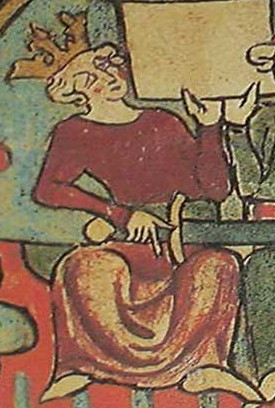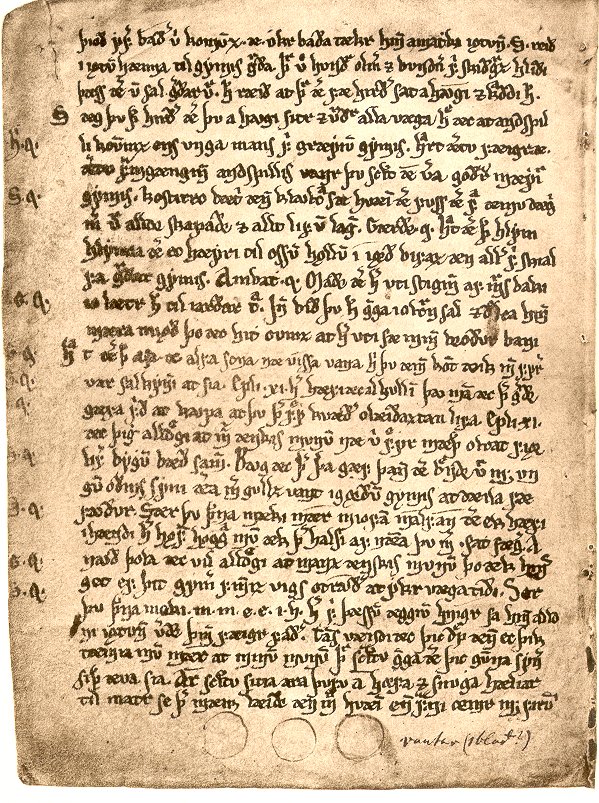|
Sigrgarðs Saga Ok Valbrands
''Sigrgarðs saga ok Valbrands'' is a medieval Icelandic romance saga The ''riddarasögur'' (literally 'sagas of knights', also known in English as 'chivalric sagas', 'romance-sagas', 'knights' sagas', 'sagas of chivalry') are Norse prose sagas of the romance genre. Starting in the thirteenth century with Norse tr .... Synopsis Kalinke and Mitchell summarise the saga thus: Composed in Iceland, presumably in the fourteenth century. Sigrgarðr, son of King Valdimar of England, obtains a magic harp from the dwarf Gestr in exchange for promising to give him his first-born son. He wins Florida, daughter of King Ptolemeus, by defeating Valbrandr, another suitor, at arms and at harp playing. Valbrandr takes revenge first by stabbing Sigrgarðr and then by killing the king in battle. Florida's two sons by Sigrgarðr are thrown into the sea, but one is rescued by a crow. King Valdimar of England frees Florida and her mother. Fifteen years later a joyful reunion takes place in England ... [...More Info...] [...Related Items...] OR: [Wikipedia] [Google] [Baidu] |
Romance Saga
The ''riddarasögur'' (literally 'sagas of knights', also known in English as 'chivalric sagas', 'romance-sagas', 'knights' sagas', 'sagas of chivalry') are Norse prose sagas of the romance genre. Starting in the thirteenth century with Norse translations of French '' chansons de geste'' and Latin romances and histories, the genre expanded in Iceland to indigenous creations in a similar style. While the ''riddarasögur'' were widely read in Iceland for many centuries they have traditionally been regarded as popular literature inferior in artistic quality to the Icelanders' sagas and other indigenous genres. Receiving little attention from scholars of Old Norse literature, many remain untranslated. The production of chivalric sagas in Scandinavia was focused on Norway in the thirteenth century and then Iceland in the fourteenth. Vernacular Danish and Swedish romances came to prominence rather later and were generally in verse; the most famous of these are the Eufemiavisorna, the ... [...More Info...] [...Related Items...] OR: [Wikipedia] [Google] [Baidu] |
Chivalric Sagas
The ''riddarasögur'' (literally 'sagas of knights', also known in English as 'chivalric sagas', 'romance-sagas', 'knights' sagas', 'sagas of chivalry') are Norse prose sagas of the romance genre. Starting in the thirteenth century with Norse translations of French '' chansons de geste'' and Latin romances and histories, the genre expanded in Iceland to indigenous creations in a similar style. While the ''riddarasögur'' were widely read in Iceland for many centuries they have traditionally been regarded as popular literature inferior in artistic quality to the Icelanders' sagas and other indigenous genres. Receiving little attention from scholars of Old Norse literature, many remain untranslated. The production of chivalric sagas in Scandinavia was focused on Norway in the thirteenth century and then Iceland in the fourteenth. Vernacular Danish and Swedish romances came to prominence rather later and were generally in verse; the most famous of these are the Eufemiavisorna, them ... [...More Info...] [...Related Items...] OR: [Wikipedia] [Google] [Baidu] |
Icelandic Literature
Icelandic literature refers to literature written in Iceland or by Icelandic people. It is best known for the sagas written in medieval times, starting in the 13th century. As Icelandic and Old Norse are almost the same, and because Icelandic works constitute most of Old Norse literature, Old Norse literature is often wrongly considered a subset of Icelandic literature. However, works by Norwegians are present in the standard reader ''Sýnisbók íslenzkra bókmennta til miðrar átjándu aldar'', compiled by Sigurður Nordal on the grounds that the language was the same. Early Icelandic literature The medieval Icelandic literature is usually divided into three parts: *Eddic poetry *Sagas *Skaldic poetry The ''Eddas'' There has been some discussion on the probable etymology of the term "Edda". Most say it stems from the Old Norse term ''edda'', which means great-grandmother, but some see a reference to Oddi, a place where Snorri Sturluson Snorri Sturluson ( ; ; 1179 – 22 S ... [...More Info...] [...Related Items...] OR: [Wikipedia] [Google] [Baidu] |

